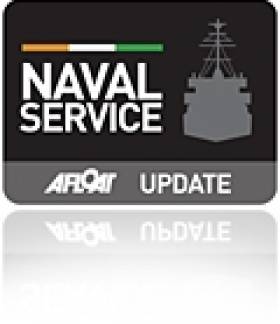Displaying items by tag: Ministers Meet Malta
Government Ministers Meet Crew of L.É. Eithne in Malta
#EithneMalta - Minister for Defence, Simon Coveney, T.D. earlier today met Naval Service personnel crew of the L.É. Eithne (P31) in Valetta, Malta.
The flagship under the command of her captain, Commander Pearse O'Donnell and his crew are continuing to undertake a key role in assisting the Italian authorities with the migrant crisis in the Mediterranean.
The Minister is accompanied on his visit by Minister for Justice & Equality, Frances Fitzgerald, T.D. and Minister of State for Development, Trade Promotion and North-South Co-operation, Sean Sherlock, T.D.
Minister Coveney said" The recent rescue operations undertaken by the Irish Naval vessel and her crew to date have impacted significantly on the lives of so many people. Up to 30 June 2015, you have rescued 3,376 migrants in 22 rescue missions".
The Minister added "The work of our Naval Service in the Mediterranean is invaluable. The Naval Service will remain in the Mediterranean undertaking humanitarian search and rescue activity. L.É. Niamh (P52) will replace L.É. Eithne over the next week or so." The Minister went on to say "Ireland's focus will remain on continuing to assist the Italian authorities in the humanitarian search and rescue operation efforts to prevent further tragedy and loss of life at sea."
Minister Fitzgerald said "I am delighted to have the opportunity to pay tribute to the exemplary professionalism of the crew of the LÉ Eithne in humanitarian search and rescue. We are proud of them and the work they are doing under the Irish flag".
Minister Fitzgerald went on to say "Migration is one of the biggest challenges facing the EU and there are no easy answers. However Ireland is committed to doing its part in solidarity with our fellow Europeans in tackling that crisis. The deployment of LÉ Eithne shows the real difference that Ireland, as a comparatively small Member State, can make and we will continue to do what we can when we can as the situation evolves".
Minister of State Seán Sherlock added "the heroic work of our Defence Forces in this exercise has been humbling."
"The displacement caused by protracted conflict has had a devastating impact on the families who have had to flee their homes and communities. Many of these very vulnerable people have fled war and persecution to seek refuge here in Europe. Ireland is making a significant contribution to addressing the root causes of displacement in countries of origin, notably through our humanitarian and development assistance in the Horn of Africa and other regions of Africa and the humanitarian support which we provide in Syria and the region."
Minister Coveney concluded "on behalf of myself and the Irish Government, I would like to thank you all for your outstanding work in the Mediterranean to date. I wish you every success for the future and a safe return to your families."






























































